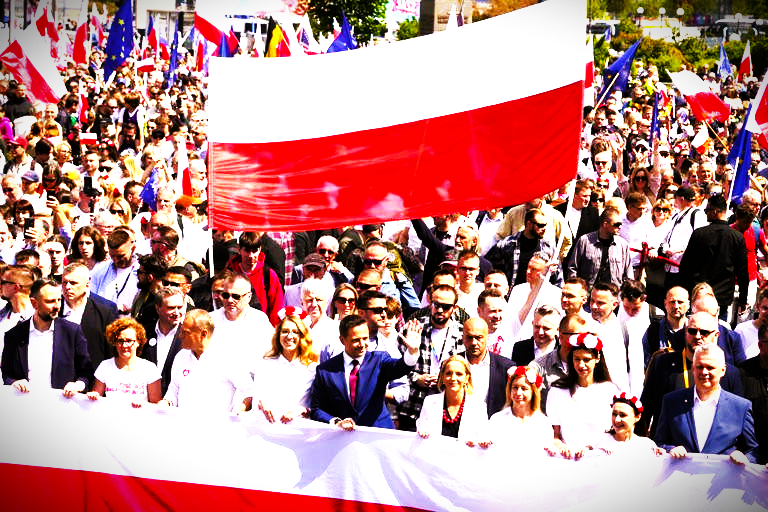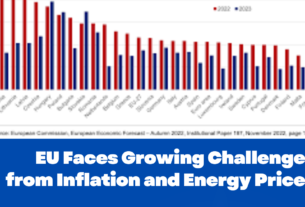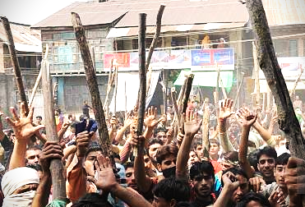Warsaw, Poland – May 26, 2025 – With the Vistula River glistening under a mild spring sun, Warsaw found itself torn in two. On Sunday, tens of thousands of Poles flooded the capital’s streets, not in celebration or protest, but in a rousing display of civic identity one split starkly between two competing visions for the future of Poland.
The dueling rallies were not just political theater; they were a mirror to a country at a crossroads. With the June 1 presidential runoff days away, the stakes could not be higher for Poland, for Europe, and for the post-war democratic order itself.
Two Leaders. Two Paths. One Nation at Stake.
In one corner stands Rafał Trzaskowski, the 53-year-old, Oxford-educated mayor of Warsaw and a stalwart of Poland’s pro-European, socially progressive center. He is promising a Poland that leans into the EU, safeguards democratic institutions, and opens its arms to marginalized communities.
A short distance away, another crowd surged under a very different banner that of Karol Nawrocki, 42, a conservative historian and ex-boxer with a pugnacious presence and a combative tone. His vision: a Poland rooted in Catholic values, national pride, and “normality” a word he repeats like a mantra.
Their supporters came not just from Warsaw, but from towns and villages across Poland. And they brought with them more than flags and slogans. They brought their hopes, anxieties, and a sense that this election could define the soul of the country for a generation.
Trzaskowski’s Europe vs Nawrocki’s Nation
At Trzaskowski’s march, placards read “Polska w Europie” (Poland in Europe), waved alongside rainbow flags and EU emblems. His speech struck a tone of optimism and urgency.
“It’s high time for truth and honesty to win,” he declared. “This decision may be one of the most important in our lives, a choice that will shape the future of our children and grandchildren.”
He painted his opponent as a threat to democracy, unfit to serve in a country striving to reclaim its place at the European table after years of friction with Brussels under the conservative Law and Justice party (PiS).
In a notable show of regional solidarity, Romania’s newly elected centrist president, Nicușor Dan, joined Trzaskowski on stage as a diplomatic signal underscoring the pro-European front emerging in Eastern Europe.
Meanwhile, Nawrocki’s rally felt like a defiant call to arms for traditionalists. Dressed in black with a red-and-white rosette pinned to his chest, he thundered about national sovereignty, Christian values, and what he described as a “war on Polish identity.”
“I am a Pole who understands the hardships of everyday life,” he said. “I am not part of the elite. I am your voice.”
To his base many of whom feel alienated by globalism and resentful of Western cultural liberalism Nawrocki is not merely a candidate. He’s a crusader.
Populism, Scandal, and the Shadow of Trump
Nawrocki’s rise has not come without baggage. Allegations have surfaced that he swindled an elderly man out of his apartment. He’s also admitted to participating in a brawl linked to football hooligans in 2009 dismissing it as a form of “noble combat.”
A moment during Friday’s televised debate sparked an online frenzy: Nawrocki appeared to discreetly place something in his mouth. His campaign later confirmed it was a nicotine pouch, but the image fed into a growing narrative of a man of the street, rough edges and all, unpolished but unafraid.
Perhaps most dramatically, Nawrocki received a quiet nod from across the Atlantic. Earlier this month, the White House released photos of him shaking hands with U.S. President Donald Trump in the Oval Office. For his supporters, it was a symbolic endorsement from a fellow anti-establishment icon. For critics, it was a red flag.
Mentzen’s Kingmaker Moment
Adding an element of unpredictability to the runoff is Sławomir Mentzen, the hard-right libertarian who garnered nearly 15% of the vote in the first round. A favorite among younger, economically libertarian but socially conservative voters, Mentzen’s supporters have become the most coveted voting bloc in the country.
Trzaskowski’s team is appealing to their pro-business instincts. Nawrocki is angling for their nationalism. Whoever succeeds in winning their trust could tip the balance in what polls suggest is a statistical dead heat.
A European Test Case
This election is not just about Poland’s domestic future. It is being watched closely in Brussels, Washington, Kyiv and Moscow.
Under PiS, Poland clashed frequently with the EU over judicial independence, media freedom, and minority rights. Trzaskowski has pledged to support Prime Minister Donald Tusk’s pro-EU government in restoring democratic norms and rebuilding trust with European allies.
Nawrocki, by contrast, offers continuity with the populist-nationalist wave that swept through parts of Europe in the past decade but which now appears to be retreating in countries like Romania and the Czech Republic.
For a continent still reckoning with the threats of authoritarianism and war on its eastern borders, Poland’s choice will serve as a bellwether.
June 1: A Nation Holds Its Breath
In 1989, Poland helped spark the democratic revolutions that transformed Central and Eastern Europe. Today, it stands at another turning point. The choice on June 1 is not just between two men. It is between two Poland’s, one open, pluralistic, and engaged with the world; the other inward-looking, fiercely proud, and defiant.
As the crowds dispersed on Sunday, one thing was clear: the energy, passion, and polarization on display suggest that Polish democracy is alive, if deeply divided.
What remains to be seen is which vision will emerge victorious and what that will mean not just for Poland, but for the fragile unity of Europe itself.




